The debut of our fully functioning hydrogen Hilux prototype in September 2023 demonstrated the breadth of technologies Toyota is applying in its progress towards carbon-free mobility. Now we are delighted to report that this ground-breaking project has moved into its final phase of development.
Ten fuel cell Hilux prototypes have been built at the Toyota Motor Manufacturing UK (TMUK) facility in Burnaston, Derbyshire. Five will undergo rigorous field testing to assess safety, performance, functionality and durability, generating test drive data in real-world situations. The other five are destined for customer and media demonstrations.
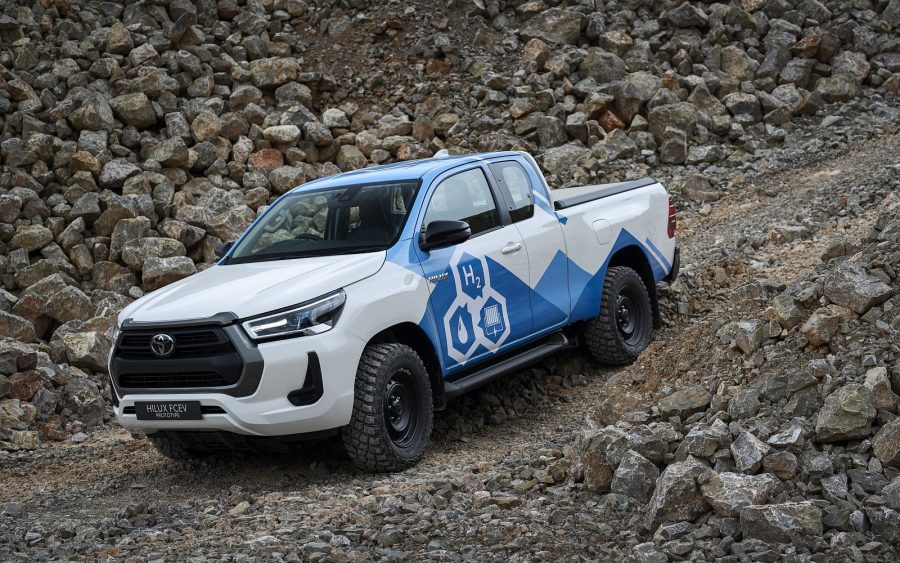
Know-how gained from the Hilux project will combine with Toyota’s 30 years of hydrogen fuel cell development and contribute to the next generation of fuel cell technology.
Hydrogen Hilux: vehicle profile
The hydrogen Hilux showcases how fuel cell technology can be integrated into a pick-up. Externally, it is the same size as a regular Hilux with an extra cab body. But beneath the surface, the chassis integrates core elements from the Toyota Mirai hydrogen fuel cell electric saloon – technology that has proved its quality in almost ten years of commercial production.
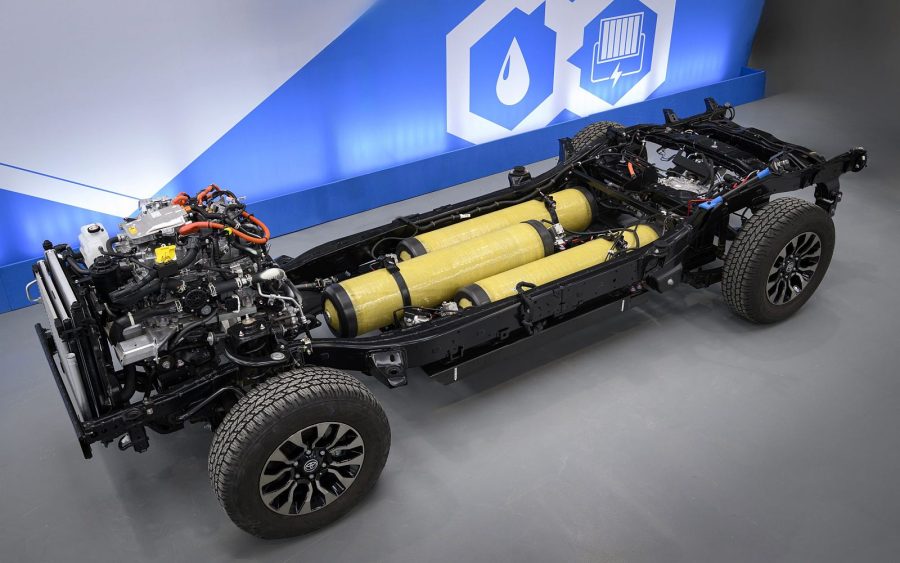
Hydrogen is stored in three high-pressure fuel tanks mounted within the vehicle’s ladder frame chassis. Each tank contains 2.6kg of liquid hydrogen to give a total capacity of 7.8kg, which is enough to offer an expected driving range of up to 373 miles. The polymer electrolyte fuel cell stack contains 330 cells and is mounted above the front axle. A lithium-ion battery in the rear load deck stores the electricity produced by the fuel cell, which in turn powers a 134kW (180bhp) and 300Nm e-motor on the rear axle. When driven, the fuel cell produces no tailpipe emissions other than pure water.
Hydrogen Hilux: provisional technical specifications
| FUEL CELL STACK | |
| Fuel cell type | Polymer electrolyte with 330 cells |
| Fuel cell power output (kW/bhp/DIN hp) | 128/172/174 |
| MOTOR GENERATOR | |
| Motor type | Permanent magnet, synchronous |
| Motor power output (kW/bhp/DIN hp) | 134/180/182 |
| Max. torque (Nm) | 300 |
| BATTERY | |
| Battery type | Lithium-ion with 84 cells |
| Capacity (Ah) | 4.0 |
| FUEL TANKS | |
| Number of tanks | 3 |
| Total capacity (kg) | 7.8 (3 x 2.6) |
| SUSPENSION AND STEERING | |
| Suspension | Double wishbone front, de Dion rear |
| Steering | Electric power steering |
| EXTERIOR DIMENSIONS | |
| Overall length (mm) | 5,325 |
| Overall width – exc. mirrors (mm) | 1,855 |
| Overall height (mm) | 1,810 |
| Front / rear track | 1,570 / 1,570 |
| Wheelbase | 3.085 |
Project history
The hydrogen Hilux project began in early 2022 with a feasibility study undertaken by TMUK and Toyota Motor Europe with consortium partners Ricardo, European Thermodyamics, D2H Advanced Technologies and Thatcham Research. Funding was subsequently gained from the UK government facilitated through the Advanced Propulsion Centre. Additional support was also provided by Toyota Motor Corporation.
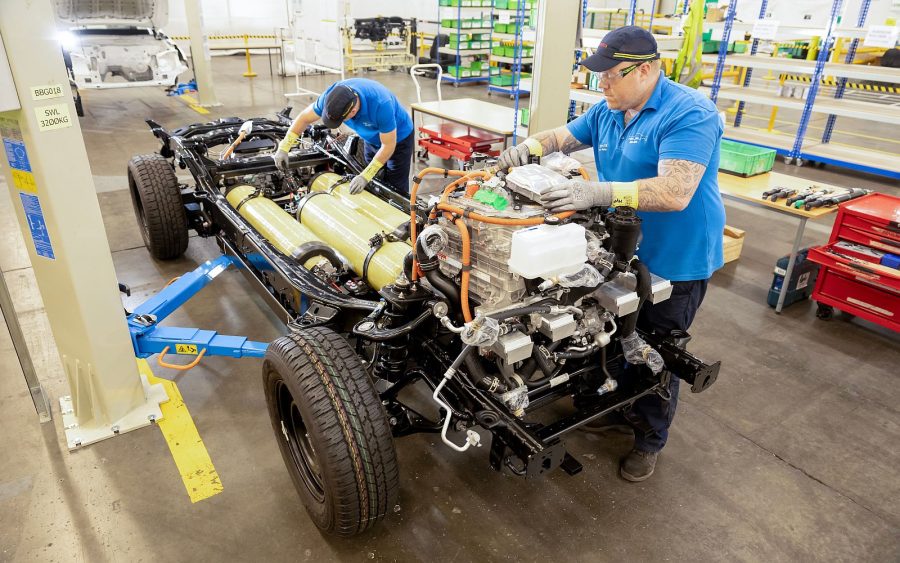
An intense design and development programme commenced in July 2022. But it wasn’t until June 2023 that construction of the prototype actually began, with work taking place in a dedicated area within TMUK’s Burnaston facility. Using efficient Toyota Production System principles, the first vehicle was completed just three weeks later. The nine additional vehicles were built by December 2023.
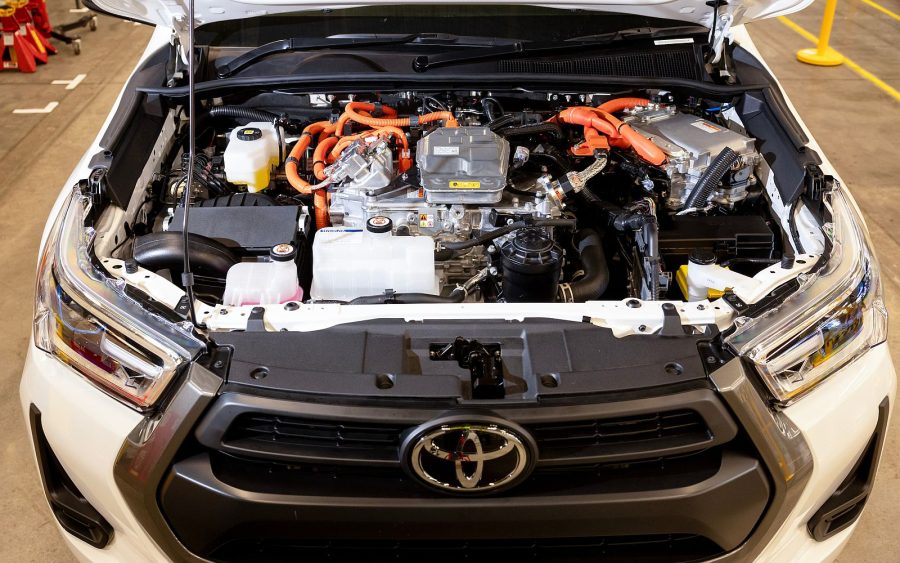
What will next-generation hydrogen technology look like?
Toyota’s industry-leading research and development in hydrogen fuel cell technology led to the launch of the original Mirai in 2015. Five years later, the next-generation Mirai introduced second-generation technology, which extended the car’s driving range by 30% to around 400 miles. It is this technology that underpins the hydrogen Hilux.
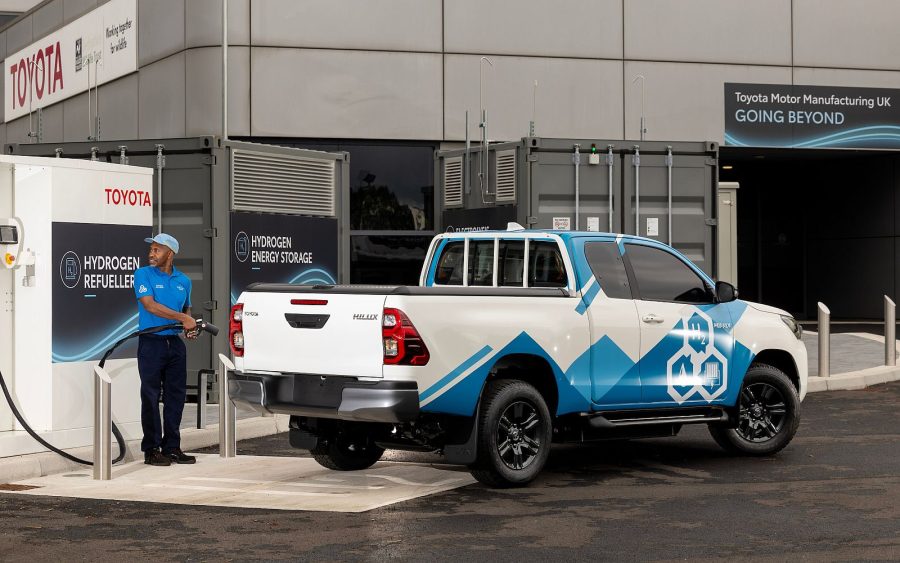
However, third-generation fuel cell technology is currently under development. It represents a key element in Toyota’s plan for expanding hydrogen usage, with sales scheduled to commence in 2026-27. These units will have a higher power density and enable an expected 20% increase in vehicle driving range, while technical advances and increased production volumes could help to reduce costs by more than one third.
Research is also progressing on the potential of creating scaleable fuel cell stacks with different power outputs. Toyota engineers are also looking at making fuel tanks with shapes more complex than the existing cylinders, which will make the technology more compatible with different size vehicles.
Learn more: How do hydrogen fuel cells work?
This article, originally published in December 2022, was updated in September 2023 and June 2024 to reflect the latest project developments.
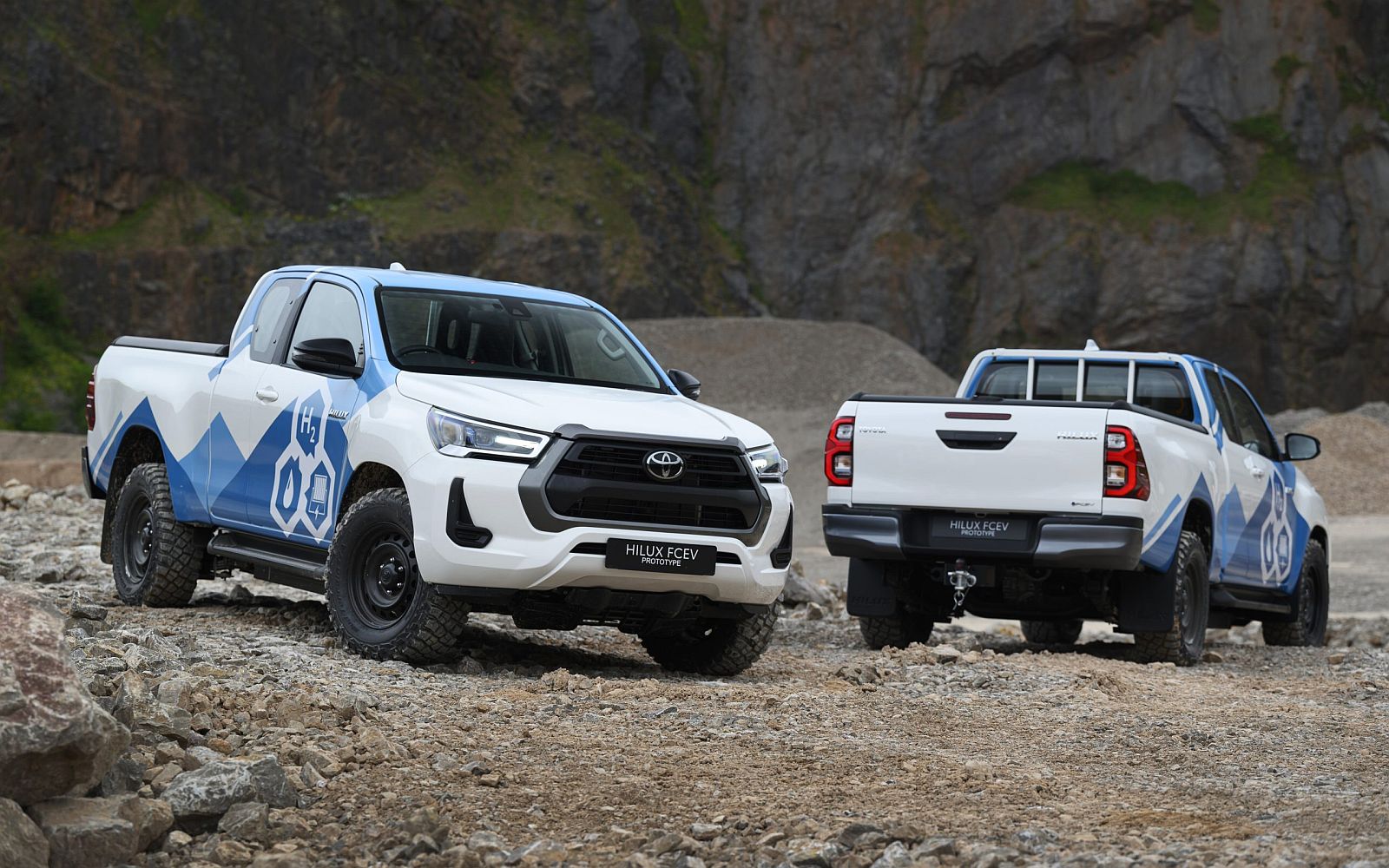
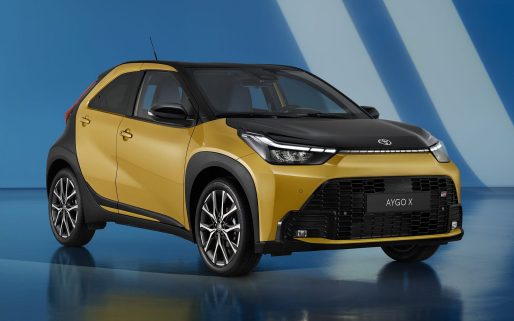

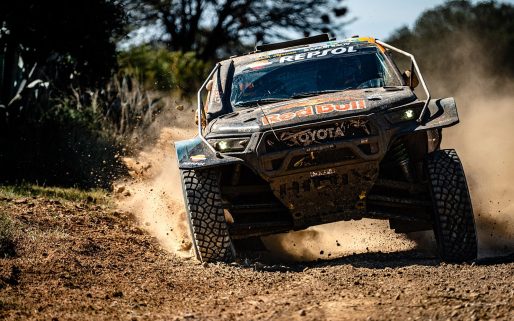
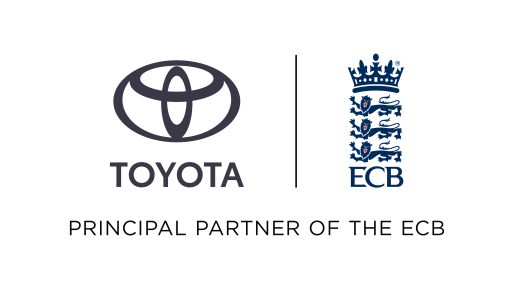
I am currently driving a Toyota Invincible with 145 thousand miles on the. My next vehicle will be the new hydrogen version of this vehicle, looking forward to that day.
Michael Hulton.
Thats great toyota Hilux
Very nice toyota corolla car.i like it.
We are excited by the news of hydrogen’s development. We would like to receive updates on your progress.
Our current fleet of company vehicles are Toyota carols commercial.
We like to have hydrogen fo our next vehicles
Hi Mike, thanks for your comment.
We are happy to hear of your interest in the Hydrogen Hilux!
For all updates, please keep an eye on the Mag and website.
Thanks.
Greetings,
How is the developing progress of the HILUX? When is going to be available for fleet purchase?
Hi Romulo,
Unfortunately we do not have any further information to share on this at the moment.
Thanks.
Hurry up and get us a hydrogen CAR ! Presumably it will be cheaper to buy than electric cars as no heavy batteries…I have had many Toyotas and always been pleased with them and their reliability,
I’ve had my Hilux for 13 years now and still love it. However, in the current environment where diesel is being discouraged, I find myself itching to get a hydrogen version. Please keep me updated!!
This excites me as logically I think this is the best way forward without doubt. This is the news ive been waiting for, as a longtime loyal customer of Toyota, having owned Rav 4, Avensis as family cars and Hilux & an Import Toyota Hill Surf-Which I adored! I do think short term Petrol / Hybrid is the sensible way forward, but ultimately I see more future for Hydrogen than Plug in electric vehicles. The electric networks could not handle the extra load, the average person has no idea how much current one of these car chargers takes to charge a car in 8 Hours! 3 Years ago they were telling us to buy LED lamps to save the carbon footprints!
Hi Mark, thanks for your comment.
We are pleased to hear you are happy with the Hydrogen Hilux!
Keep an eye on our website and mag for future updates!
Thanks.
I cant wait for Hydrogen cars, its got to be the UK future. It will be easy to install at filling stations and when we get Hydrogen heating there is no reason we that we cant harvest that, for filing our cars at home its got to be the future with electric just an interim. I for one cant wait for Hydrogen cars the country should be turning to this now as electric cars are failing.
I would love to see this added to the Motability scheme. Currently there are very few suitable options for ambulant wheelchair users who require plentiful storage space and a comfortable ride. 🤞🤞
Hi Helen, thanks for your interest in the Hydrogen Hilux!
Your feedback is greatly appreciated and will be passed on to the relevant teams.
Thanks.
Having pioneered H2FC CHP in the UK (demonstration projects in 2004 and 2008), I have been an advocate of the fuel cell for decades.
I have converted gas-guzzling 5.9-litre and 6.3-litre Bristol V8s to dual-fuel (petrol/LPG) to make them cheaper and cleaner to run, so alternative fuels and finding refilling stations doesn’t worry me.
I tow a caravan. I cannot see EVs replace ICEs, but I think the HiLux FC will make a fantastic low-carbon tow-car. I’d like to be an early adopter of this technology.